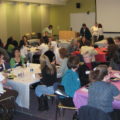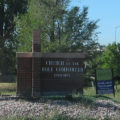Massacre at VA Tech – Malaysian Students Safe
read a headline I spotted via Google News this morning. Naturally, it came from Malaysia’s Straits Times newspaper.
It’s facile to say that the global is local and the local is global. But there’s more to this particular phenomenon. When we hear about horror anywhere in the world, the natural human instinct is to want to make sure our own loved ones are safe. But we also nurture a sneaky desire, hidden even from ourselves, to have some connection to the news, to somehow feel we are participants, not just audience, in a great world drama.
Of course, no one wants to be directly affected – to be killed or wounded, or have that happen to someone we know and love. But to be able to say that we were somehow part of the larger story – it’s only human to enjoy that.
This is the bread and butter of local newspapers, as I see constantly illustrated in the posters advertising Lecco’s local and regional papers. “So-and-so disaster elsewhere in the world: no Lecchese hurt”. But sometimes they are: “Lecchese drowns swimming in Rimini” appeared a year or so ago – this would hardly be local news (Rimini is on the Adriatic coast, nowhere near Lecco) except that a local man died.
As soon as something dramatic happens anywhere in the world, we would all like to be able to say whether or not we are connected with it or hurt by it. An ideal headline would read: [disaster] strikes [someplace else], hundreds dead – but no one you know.
Hence this modest (and ironic) proposal to some entrepreneur who’s got the technical skills: find a way to combine (mash up) Google News with all my social networks, so that I can immediately know whether the horrible (or good) events of the day hit me close to home. Call it “Six Degrees from Disaster,” because, as John Guare illustrated, we are all at most six “links” away from anyone in the world – in tragedy or in triumph.



